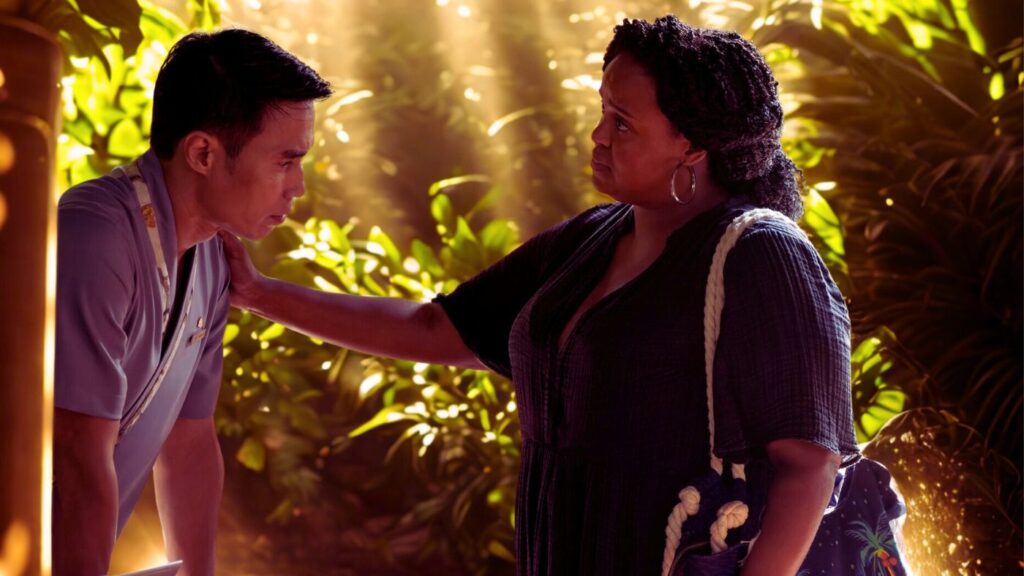The White Lotus Season 3 Finale Shocker: Twists, Deaths, and Moral Dilemmas
The third season of The White Lotus delivered a finale packed with emotional turbulence, unexpected betrayals, and philosophical reflections. Titled “Amor Fati”—Latin for “love of fate”—the episode wrapped up with five major deaths, multiple life-changing decisions, and some deep existential soul-searching. Viewers were left both shaken and contemplative, as the finale challenged the notion of justice, identity, and inner peace.
The Episode’s Title and Theme: What Does Amor Fati Really Mean?
Amor Fati, a phrase often used in philosophical and theological circles, urges us to accept fate—not just the pleasant parts but the painful ones too. In the finale, this theme is carried throughout several storylines. The show opens with Luang Por Teera giving a profound talk about human suffering and the illusion of permanent solutions. It sets the tone for what becomes a sobering reflection on life, choices, and consequence. Each character’s journey is tied back to this idea—that to move forward, they must embrace even their most difficult experiences.
The theme resonates especially with characters like Rick, Belinda, and Gaitok, whose actions question whether fate is truly unavoidable or shaped by their own compromise and ambition. The idea that “there is no resolution” is subtly echoed in every major plotline, warning viewers not to expect a fairytale ending.
The Thai Girlfriends Shine Bright Amid the Chaos
The introduction of Thailand’s fabulous trio—played by Michelle Monaghan, Leslie Bibb, and Carrie Coon—was one of the highlights of Season 3. These 40-something friends brought humor, glamour, and emotional depth to the otherwise somber narrative. Whether they were engaging in spiritual retreats or indulging in luxurious beachside gossip, their presence added contrast and complexity to the larger ensemble cast.
But it was Laurie’s emotional breakdown at dinner that offered one of the show’s most touching moments. Comparing her failures to her friends’ polished lives, she delivers a gut-punch line: “I’m glad you have a beautiful face, and I’m glad you have a beautiful life, and I’m just happy to be at the table.” In a show centered on privilege and perception, Laurie’s vulnerability served as a grounding reminder of what it means to belong.

Belinda’s Comeback: Redemption or Regression?
Returning from Season 1, Belinda reappears with her son, Zion, in a surprising plot involving Greg, Tanya’s emotionally distant husband. Together, they confront Greg and demand $5 million. Initially framed as a means to finally realize her dreams, Belinda’s plans quickly unravel when she abandons her Thai partner Pornchai and her spa aspirations the moment money becomes real. Zion’s manipulation and poetic references serve only as smokescreens for their true intent—wealth.
While fans may feel vindicated seeing Belinda get what she was once denied, the way it unfolds is morally murky. Her look of discomfort during negotiations and dismay at Zion’s casual disregard for Greg’s history may suggest internal conflict, but in the end, money wins. Belinda walks away richer but tainted by the same manipulative tactics she once suffered under.
Gaitok’s Dilemma: Faith Versus Survival
Gaitok’s arc is one of the most compelling in this season. A devout Buddhist, he initially refuses to betray Valentin and his Russian friends despite knowing their criminal involvement. He believes deeply that any action potentially leading to death must be avoided. However, when Sritala orders him to shoot Rick, who had just assassinated Jim Hollinger, Gaitok hesitates… then pulls the trigger.
This moment is heartbreaking. Gaitok, once the moral compass, sacrifices his beliefs for a new career and security. In the finale’s closing scenes, he is rewarded—chauffeuring Sritala with Mook cheering him on. Yet it leaves viewers questioning whether the cost was worth it. Gaitok’s decision perfectly illustrates the show’s larger message: that ideals are often compromised in the face of ambition and fear.
Rick and Chelsea: A Love Story Turned Tragedy
Rick’s storyline reaches a stunning climax when he returns from Bangkok ready to start over with his ever-positive girlfriend, Chelsea. But a confrontation with Jim—his biological father—triggers a fatal chain of events. After a heated argument where Jim insults Rick’s mother and flashes a firearm, Rick reacts instinctively and kills him. In the chaos, Chelsea is accidentally shot by the Hollingers’ guards.
Two major revelations occur here: first, the mystery gunshots from Episode 1 were Rick’s. Second, Sritala reveals that Jim was Rick’s father all along—a theory many fans suspected. As Rick and Chelsea float lifelessly in the water, the symbolism is painfully poetic. His unresolved trauma literally and figuratively drowns them both. Her earlier comment about their yin and yang battle foreshadows this haunting ending, where Rick’s darkness ultimately overcomes Chelsea’s light.
The Ratliffs’ Poison Plot: A Brush With Death
Among the most disturbing storylines was that of the Ratliff family. Tim, the troubled patriarch, becomes increasingly obsessed with ending their financial and spiritual suffering. After Piper decides to leave the Buddhist temple, possibly to stop Lochlan from following her lead, Tim sees no other way but to “set them free.” He mixes poison seeds into piña coladas and tries to get his family to drink them, excluding Lochlan at first—but later tries to involve him too.
The plan fails when Tim changes his mind last minute, destroying the drinks. However, the next morning, Lochlan unknowingly uses the same blender and almost dies. The episode does not end with a perfect resolution for them. As they leave Thailand, the family regains access to their phones—meaning the truth about Tim’s plan is about to unravel. Still, Tim’s introspective moment on the boat hints at a changed man, influenced by the teachings of Luang Por Teera about human existence and consciousness.
The Real Message: No Neat Endings, Only Acceptance
Mike White avoids wrapping things in a bow. Instead, the finale underlines a harsh truth: life does not always offer redemption or justice. Belinda’s greed, Gaitok’s compromise, Rick’s revenge, and Tim’s unraveling all suggest that people often make choices that go against their values when pushed to the edge. Yet, these choices are entirely human.
The dinner scene with the Thai girlfriends, particularly Laurie’s teary-eyed admission, stands out not because of its drama but its raw honesty. It tells viewers that being present and appreciative—even in your flaws and failures—is perhaps the most powerful lesson of all. And maybe that is what Amor Fati really asks of us: to embrace it all, even the imperfect, unresolved parts of life.
Frequently Asked Questions (FAQs)
What Does The Title “Amor Fati” Mean?
“Amor Fati” is a Latin phrase meaning “love of fate.” It suggests embracing everything in life, including suffering and hardship, as essential parts of existence.
How Many Characters Died In The Season 3 Finale?
Five characters died, including Chelsea and Jim Hollinger. Additionally, there was one near-death experience involving Lochlan and several attempted poisonings.
What Happened To Belinda In Season 3?
Belinda reappears and manipulates Greg into giving her and her son $5 million. However, she abandons her previous dream of running a spa, showing a morally gray side of her character.
Who Is Rick’s Father?
Rick’s biological father is revealed to be Jim Hollinger, a twist confirmed during a dramatic confrontation that ends in Jim’s death.
Why Did Gaitok Betray His Beliefs?
Gaitok, a devout Buddhist, ultimately chooses to shoot Rick to protect his future career and align with Sritala, despite his earlier vow against taking any action that might cause death.
Does The Finale Offer Closure?
No. True to the theme of “Amor Fati,” the episode emphasizes that closure is a myth. Characters must accept the consequences of their actions, even if it brings discomfort or ambiguity.
Final Thoughts
The White Lotus Season 3 finale is not just a dramatic ending—it is a philosophical reflection on fate, suffering, and human flaws. By refusing to give neat conclusions, it invites the audience to ponder their own values and judgments. With unforgettable performances, clever symbolism, and deep storytelling, “Amor Fati” stands as one of the most thought-provoking television episodes in recent memory.




















